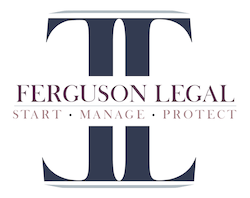Understanding Bylaws: A Guide to Their Importance and Creation
Are you familiar with bylaws for a corporation or how they differ from an operating agreement? An operating agreement is a contract that outlines the ownership and operating procedures of the LLC. Bylaws are a contract that defines the structure, roles, and responsibilities of the Corporation’s shareholders (owners), officers and board of directors so it functions smoothly and in compliance with applicable laws. In a corporation the owners are called “shareholders” or “stockholders.” So whenever we refer to “shareholders” we are talking about the owners of a corporation.
Well-crafted bylaws are important because they establish clear governance structures, prevent conflicts, and contribute to the stability and clarity of the corporation. Because they can be tricky to understand, Ferguson Legal, PLLC will break it down for you.
What Are Bylaws?
Bylaws are the internal rules that govern the day-to-day operations of a corporation. They outline the procedures for holding meetings, electing directors, and making decisions. Unlike articles of incorporation, which establish the existence of the corporation, bylaws dictate how it should be run. They are essential to make sure the corporation operates properly.
Why Bylaws Are Important
Bylaws aren’t just a formality; they’re a legal requirement in many jurisdictions. Beyond legal compliance, bylaws provide a clear corporate structure to resolve disputes and prevent conflicts. They enhance organizational stability by providing a clear understanding of roles, responsibilities, and procedures.
The Components of Bylaws
Name and Purpose
The bylaws should state the official name of the corporation, including where its registered, and its mission, including the objectives it seeks to achieve.
Shareholders
This section outlines the criteria for shareholders, including the rights and responsibilities of shareholders and their ability to vote on certain corporate decisions. It also details the process for admitting new shareholders and the circumstances under which ownership shares may be revoked.
Board of Directors
The bylaws should define the structure of the board, including the roles of key officers such as the president and treasurer. It should also include procedures for the election and removal of directors, as well as guidelines for board meetings.
Officers and Their Duties
Each officer’s responsibilities should be clearly outlined, ensuring that all roles are well-defined and that there is accountability within the corporation.
Committees
If the corporation has committees, the bylaws should specify their formation, duties, and the scope of their authority.
Meetings
This section should detail the frequency of shareholder meetings, the requirements for notice and quorum, and the procedures for voting.
Amendments
Bylaws should include a process for amending them, ensuring that they can evolve with the organization’s needs.
How to Draft Bylaws
Drafting bylaws involves several steps:
Research Legal Requirements
Before drafting, it is crucial to understand the legal requirements that apply to your corporation.
Initial Drafting
Begin by drafting the key provisions, keeping in mind the specific needs and goals of your corporation.
Consult Stakeholders
Engage with stakeholders, including shareholders and legal advisors, to gather input and ensure that the bylaws are comprehensive and practical.
Review and Revise
Repeatedly review and revise the draft to address any potential ambiguities or gaps.
Formal Approval
Once finalized, the bylaws should be formally approved by the corporations governing body, which may be the shareholders or board of directors.
Do what you can to avoid common issues during this process. Make sure that the language used is clear and precise, that all key areas are covered, and that the bylaws comply with all legal standards.
Implementing and Enforcing Bylaws
After drafting, it’s time to effectively implement and enforce the bylaws. This includes communicating the bylaws to all shareholders, providing training for board members and officers, and establishing procedures for monitoring compliance and handling violations. Regular reviews and updates of the bylaws are necessary to make certain they remain relevant and effective.
Update Your Bylaws with Ferguson Legal, PLLC
Regularly reviewing and updating your bylaws is crucial to maintaining a well-governed and stable business or organization. If you’re unsure of where to start, seeking professional legal advice is a valuable step to take.
We invite you to share your experiences with drafting or revising bylaws in the comments. If you need further assistance, please reach out to Ferguson Legal, PLLC through our contact form for a consultation.





